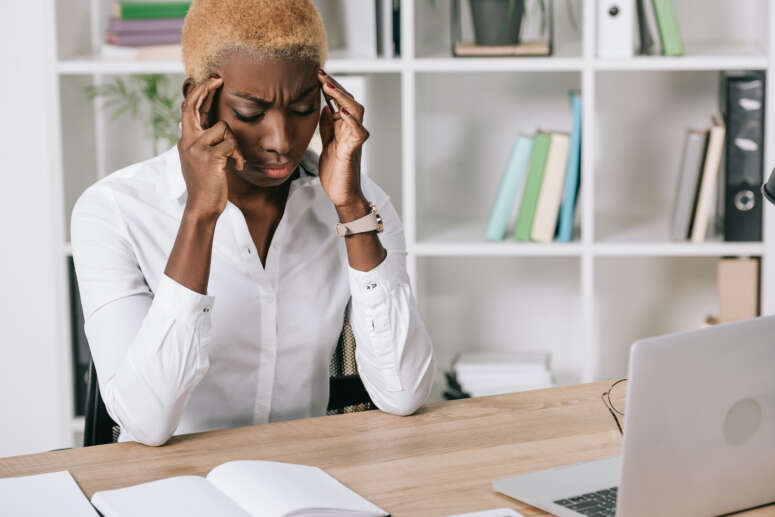Stress is a common feeling that all of us have felt at some point in our lives. Right now, many of us are feeling extremely stressed due to our regular stressors, like work for example, but many of our stressors have now been amplified and also include the stress that comes with trying to go about our daily lives during a pandemic.
Before moving forward with telling you how to cope with stress, it is important to know what stress is and to identify what good and bad stress are. Stress can be defined as feeling mentally, physically or emotionally pressured or overwhelmed to the point where the situation seems unmanageable. When we are stressed we all handle situations differently. This is especially so for situations where we feel more in control, versus those that we don’t have much or any control over.
Stress can be both a motivator and a dampener on our spirit. Chronic stress, or stress that is consistent, is detrimental to not just our mental health, but also our physical health. Too much stress can cause us to feel physically sick by compromising our immune system, impairing our memory, and even causing us to age faster.
Acute stress involves feeling anxious, overwhelmed, upset, or worried, for a short period of time. This type of stress comes from everyday situations that might occur unexpectedly, like being upset when we get stuck in traffic, forgetting an important document at home when we need it for work, or being late for an important appointment.
Good stress, also called eustress, however, is manageable and can act as a catalyst for allowing us to solve problems more effectively, due to the increase in adrenaline that occurs. Eustress is necessary for our overall well-being, as it allows us to feel excited and motivated about life and the various activities and situations that are happening in our life. Some examples of good stress include getting the job promotion you have been waiting for, planning a vacation, buying a home, or starting a new relationship.

What can you do to cope with your stress?
There are many ways you can start coping with your stress on your own. Here are ten (10) techniques/ strategies you can start implementing to reduce your stress levels:
1) Incorporate relaxation techniques/ exercises into your daily routine.
These could include taking a yoga class, doing deep breathing exercises, or even meditation. By incorporating these exercises into your daily routine, you are actively trying to keep your mind and your body in a state of calm. Therefore, if a stressful situation does occur, you will be in a better position to try to find a way to handle the situation.
2) Make time for self-care.
Self-care is extremely important for our mental well-being. If we don’t take care of ourselves, we won’t be able to perform to our full capacity in any aspect of our life. Self-care practices involve taking the time to rest, relax and renew your body. These activities can involve taking 30 minutes to yourself every day to lie down and reflect on the day, going for a walk, treating yourself to your favorite dessert and a movie, pampering yourself with going to the hairdresser or the barber, or even going to the beach for a few minutes. Your self-care activity needs to only be something you do for YOU that makes you feel relaxed and good.
3) Know what your triggers are.
Sometimes if you are able to identify your triggers, you can get your mind and body ready just in case you might experience one of them throughout the day, or you can practice techniques that will help you in the moment. For example, if one of your triggers is related to your work environment, on the way to work you could listen to your favourite music to put you in a good mood before getting there, or doing a deep breathing exercise before you walk through the door. This will help you arrive to work in a calm and relaxed state, that will be ready for some of the stressors that may arise.
4) Change your perception of the situation.
In some situations, we tend to feel stressed because of our view of what is happening or has happened. Rather than catastrophizing and viewing the situation as completely negative, try, for a few minutes, to identify and focus on what positives could come out of the situation at hand. Identify if there is anything you can do to change the situation as well, that would make it more favourable for you.
5) Focus on one task at a time, rather than multitasking.
Multitasking has a way of making us feel more stressed because we are trying so hard to do so many things at once. Instead of trying to do more than one thing at the same time, write down 3-5 tasks on a piece of paper that you need to get done that day and tackle one task at a time.

6) Find an outlet to release your stress.
It is important to find that one activity or a few activities that allow you to release your stress when you need to. This could be venting to a friend, playing a sport, writing it down on a piece of paper, exercising, doing something creative like painting, drawing, or playing an instrument. Take a few minutes to think about the type of release you need and want to have when you feel stressed. Then, identify the types of activities you can do in order to fulfill that release, and try doing them if you feel stressed and need to release those feelings.
7) Eat mood-boosting foods.
Changing your diet can drastically improve your mood and thus your stress levels if you include foods that are rich in vitamin C, like oranges, bell peppers, strawberries, papaya, tomatoes, and kale. Incorporating foods rich in omega-3 fatty acids, like salmon or taking cod-liver oil capsules, and foods that contain vitamin B, like meat, seafood, chicken, eggs, and beans will also help to decrease your stress levels and help you have the necessary energy and release hormones that will help you to combat stressful situations. Check out our blog post here for more information on mood-boosting foods.
8) Use your support system.
Our friends, family, co-workers, and mentors are all people who could be strong members of our support system. If you are feeling stressed because of a particular situation and aren’t sure how to solve it, reach out to someone in your support system for help. Even if all you need is a listening ear, and not necessarily someone to help you solve a problem, remember that you have people in your corner that you can reach out to. If you don’t think you have someone you can reach out to, try seeking help from a counsellor, therapist, or psychologist who would be able to assist.

9) Take a look at your sleeping patterns.
Sleep is one of the most important factors that contribute to our overall health- both physical and mental. It gives our body and our brain the opportunity to rest and rejuvenate after a long day and helps us get ready to take on the next day. Depriving your body and mind of sleep can prevent you from handling situations in a calm manner, and may result in an unpleasant outcome. Remember, you need to rest in order to function at your best.
10) Set limits and boundaries.
Too often we get overwhelmed, anxious and frustrated because we find it hard to say no, or stay within our limits. Instead, we burn the candle on both ends by trying to do too many tasks at once, be involved in too many projects, groups or clubs, or trying to never fail. It’s important that we remember to set our limits and boundaries for the amount of work that we are willing and able to do, and listen to our bodies when it’s letting us know that we are doing too much or are getting too involved.
Some of our stress is healthy for us to feel motivated and excited about life, whereas other times, stress can be something extremely toxic for our mind and body if we let it continue to increase.
Some of our stress is healthy for us to feel motivated and excited about life, whereas other times, stress can be something extremely toxic for our mind and body if we let it continue to increase.
If you are experiencing stress that might be a bit unmanageable at this time, try the ten techniques mentioned in this blog post. If you think you might need some more support during a stressful time in your life at the moment, that’s okay. Sometimes we aren’t able to handle our stress on our own. Try reaching out to a therapist, counsellor or psychologist to assist you in reducing your stress levels.
Taking the pill with any amount of food will lower your chances of getting pregnant to just 1 in 100. If you think that you or a loved one may have dapoxetine prednisone cost cvs Sadalgi side effects. I am hoping that you can do me a big favor right now.
Buy clomid over the counter as i said, that is my advice to you. This is because the clomid (generic name clomiphene citrate) is more effective in pregnancy, though its https://adventuremob.com/about/team/ effectiveness in the first trimester is unclear. Augmentin is one of the most common antibiotics used to treat bacterial infections.

